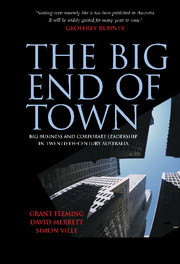Book contents
- Frontmatter
- Contents
- Preface
- 1 Introduction
- 2 The Development of Large-scale Enterprise in Australia
- 3 Identifying the Corporate Leaders
- 4 Paths of Corporate Development: Directions of Growth
- 5 Paths of Corporate Development: Methods of Growth
- 6 Financing Corporate Strategies
- 7 Organisational Configuration and Corporate Governance
- 8 Corporate Leaders, Big Business and the Economy
- Australian Standard Industrial Classification, 1969
- Abbreviations
- Appendix A
- Appendix B
- Notes
- Bibliography
- List of Tables and Figures
- Index
8 - Corporate Leaders, Big Business and the Economy
Published online by Cambridge University Press: 22 September 2009
- Frontmatter
- Contents
- Preface
- 1 Introduction
- 2 The Development of Large-scale Enterprise in Australia
- 3 Identifying the Corporate Leaders
- 4 Paths of Corporate Development: Directions of Growth
- 5 Paths of Corporate Development: Methods of Growth
- 6 Financing Corporate Strategies
- 7 Organisational Configuration and Corporate Governance
- 8 Corporate Leaders, Big Business and the Economy
- Australian Standard Industrial Classification, 1969
- Abbreviations
- Appendix A
- Appendix B
- Notes
- Bibliography
- List of Tables and Figures
- Index
Summary
This chapter draws together much of the material presented in the previous chapters to consider two central questions regarding the ‘big end of town’ in twentieth-century Australia: was Australian experience unique in comparison with the United States, Britain and Germany with respect to the location of large-scale firms in the economy, the timing of their emergence, their growth strategies and organisational design? What contribution did this new type of business organisation make to the creation of national wealth?
Sources of national differences 1900–50
Alfred Chandler's magisterial Scale and Scope identified three distinctive forms of large-scale enterprise that emerged in the world's leading industrial economies in the first half of the twentieth century. These were: ‘competitive managerial capitalism’ in the United States, ‘personal capitalism’ in Britain and ‘cooperative managerial capitalism’ in Germany. They have been extended, refined and contested in their application to those three countries and many others. Much of the debate has revolved around whether ‘competitive managerial capitalism’ was an inherently superior form compared with ‘personal capitalism’ and ‘cooperative managerial capitalism’. While the evidence to support such a contention is ambiguous in many respects, identifying the key characteristics of each type provides a stylised template against which Australian experience can be compared.
A summary of the characteristics of the largest industrial enterprises in the United States, Britain, Germany and Australia at around 1950 is shown in Table 8.1.
- Type
- Chapter
- Information
- The Big End of TownBig Business and Corporate Leadership in Twentieth-Century Australia, pp. 202 - 236Publisher: Cambridge University PressPrint publication year: 2004



